I need to write 33 future birthday cards to my two sons but can’t decide what stationery to use. Or is it the thought of writing the first one? Or having them finished, one on top of the other, in a neat pile in front of me? Thirty three rectangular reminders of every single birthday I will miss when I am gone.
My eldest is almost six and my baby boy is 18 months. And in a year, or probably two, on a May or a November day, their mum will take an old shoe box from a drawer and pull out the first card from Dad. And then for every year until they’re 21. So I need to write these cards, if that’s my plan. I need to start.
It began with one clown foot that wouldn’t leave the ground. And the slapping sound as I ran for a bus. And being asked why I was limping when I wasn’t aware I was limping. Less than a year later, and I wield my leg like a bag of shopping and each week I feel sure someone adds another can of beans. Potatoes. Or a marrow. I still have my hands. But my wife had to lift them on to the keyboard to write this.
Five-year-old Tom sees it all. In his pre-school years I was at home full-time, and so the history of our lives is closely bound together. It was a golden time, navigating a social sea that glistened and moved with all the spectral colour that autism can gift a young life. Each day we were Darwin in the New World, arriving on the shores of the Galapágos. Identifying and naming and creating the world anew.
But Tom and I no longer chart the day ahead as if the land were a vast map unfurled from the kitchen table. It’s a different life. Last week, I waited in a cafe while my family strode out on to a beach, observing happiness as it tumbled on to the sands. I can see that my loss is not the same as my children’s loss. For my children, my declining capacities are just things to observe.
I’m working out how long this might take, logging all the many selves I’ve lost this year. I know in some loose form that I will be here for Tom’s seventh birthday. And I’ll prepare my shoe box full of cards from there.
When I was told I had motor neurone disease, after first being told that I didn’t, the abdominal sob I experienced was like the deep shudder of a kitchen tap after the mains water is turned back on. I remember looking up at Gill, my wife. She was crying more gently as she looked down at me – with sorrow, not for herself, but for me. By this point, my sodden cheek was resting on my knee, with my neck craned round and up towards her. I will never read a face like that in a moment like that again. It’s a wonder to know that with all the muscles in the human face, the permutations are as unique as fingerprints.
I have no option but to accept Gill’s tenderness. This woman who has caught our falling family in her palm, who swims in fear for what’s to come. Sometimes I watch her as she looks after me, and wonder how I became this fortunate.
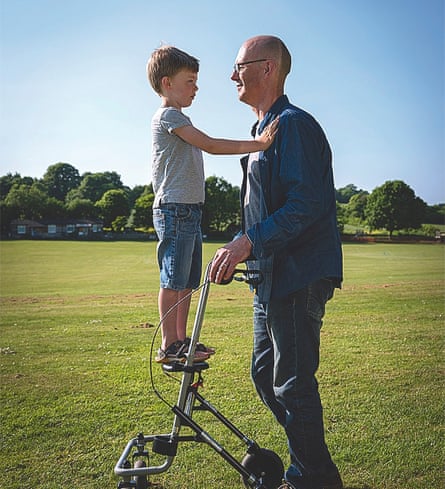
There is a process to the letting go. And it begins with a soft severing. It was there in the moment Jimmy cried and I knew I’d lost the strength to hold him in my arms; and the first occasion Tom just assumed that I wouldn’t be the one taking him swimming. It seems that lately I’ve been squinting through glass at a miniature diorama, watching Gill and the boys go around and around on a wheel. I just assumed that we were formed from a single piece, a little family of four pinched into human form and then set firm – so that one figure could never be the person observing all these parts from the outside. That it will necessarily become a single entity made up of three figures is a concept that I look at and look at and look at, and cannot understand it.
I had no previous facility for crying, no real experience of it, but after my diagnosis this is what I did for the next five nights and five days. In the evenings I built Lego and read stories. When Tom fell asleep, I began again. I’ve had conversations about the value of laughter but I no longer believe it is the best medicine. At the end of my five days of crying I felt calmer, more at ease and more content than at any time in my life. I know the glass is thickening and the figures in my life are blurring. I know this is happening and I know how it finishes. And I know that, despite all this, the end of my life is becoming the best of my life; not the worst.
At some point my wheelchair will resemble a spacecraft, with rods and pads and dials and bleeps. I will tell my story to my youngest son – of baby Jimmy, the astronaut in nappies, and journeys to the Milky Way. Life will change again. I used to think the presence of children elevated my condition to tragedy. I no longer think that; I think the opposite. I think we’ll tell new stories. And those who love us will tell these stories, too. We’ll find new ways. Because we have to.
As a writer, I have been stuck for years. But I think a terminal diagnosis is the very finest tool a writer can have; it’s the view from an escarpment of both the beginning and the end. It has enabled me to write with a lightness about my life and this time. The book I’m writing is for my two children, no one else, so that when they are in their 20s or 30s or 40s and want to know who their dad really was, they can find out. I want them to know how remarkable this time was.
Gill and I now spend our evenings like generals around a table conducting a ground offensive to create some kind of life below and beyond our second-floor south London flat. Like most ground operations of modern times, there’s no way this can ever work. We rebuild our life each day from Sellotape and bits of old cereal boxes, and keep a pot for the tuppences we find under the sofa. We were not prepared. We have so little. Just determination, our imagination. And some faith that we will be OK.
Now I need to write my cards, all 33 of them. It was a friend who said that birthdays were the times he missed his father most. I know it doesn’t matter what I write or draw. Something silly would be best, because I was. And something interested. Because I was. Thinking who these boys might be, card by card, year by year. Taking what I know and seeing how it grows. And at the end I have the thought that maybe I will come to know something of their future selves. It’s the strangest thought, and strangely sad, that maybe I will be there first. Waiting for them. Not in any scriptural sense, purely my imagined sense. My desire to be: that what I say will show them, my two sons, that I was always there.
So I need to stop thinking about the colour of the paper and whether to make the cards myself. Or whether to embark on a pointless quest for 33 uniquely diverse and unforgettable birthday cards. I just need to be their dad, and to write and doodle and imagine who these boys will be. And to know that this is all I can do. That my part is ending, that it was good, and that it was enough.
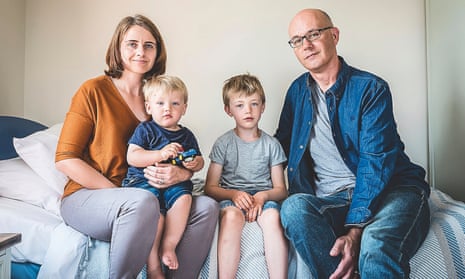



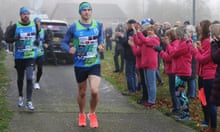


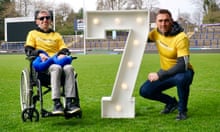

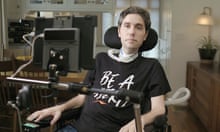

Comments (…)
Sign in or create your Guardian account to join the discussion